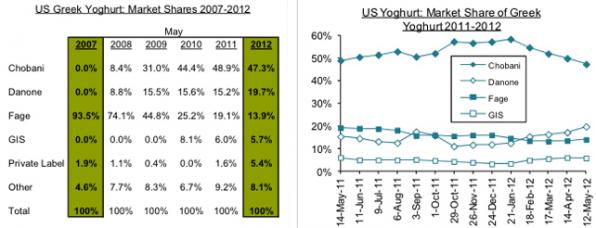The story of Chobani yoghurt is one that has all the hallmarks of ‘made in America’. The brand was founded by Hamdi Ulukaya, an immigrant from Turkey who reportedly wanted to recreate the yoghurt he used to eat on his parent’s dairy farm in Turkey. Capitalising on a sudden and unexpected boom in American demand for ‘Greek yoghurt’ as well as some canny marketing moves, a few short years later Chobani is the leading brand of ‘Greek’ yoghurt in the US, and Mr Ulukaya a billionaire.
Meanwhile the Greek company Fage has struggled in the American market. In 2007 Fage had a 93.5% market share of U.S. Greek yoghurt sales, with few other competitors. Chobani was not even on the market. By 2012, Fage’s market share had fallen to 13.9% whereas Chobani had risen to market leader with a 47.3% market share.
 Source: adage.com
Source: adage.com
But dark twists are now emerging in this good old-fashioned tale of rags-to-riches capitalism. The New York Post reports that according to a filing made recently by Ulukaya’s ex-wife with whom he is in a legal battle, Chobani’s original recipe was actually the product of corporate espionage on Fage.
In a court filing Ayse Giray claims that Ulukaya travelled to Europe to meet with a former employee of Fage whom he paid 30,000 euros for the secret recipe. The accusation comes as part of a wider legal battle between the former couple with Giray claiming that she actually owns 53% in the yoghurt company.
According to the yoghurt magnate’s ex wife, when Ulukaya launched the company Euphrates – a predecessor to the Chobani company – the Turkish businessman was strapped for cash. As a result he borrowed 500,000 dollars from Giray in return for a 53% share of the company (Ms Giray produced a handwritten letter from Ulukaya to that effect). So desperate was the Turkish businessman according to Giray that he also stole money from his brother by stealing cheques and forging his signature.
Ulukaya reportedly admitted that the letter was his, but denies that it proves that Giray owns any stake in Chobani, telling her lawyers that it was a “hypothetical transaction designed to defraud Turkish banks.”
A Chobani spokesperson also said that the claims made by Giray were ‘baseless and without merit.’
Meanwhile in a separate development Fage also recently scored a significant legal victory against Chobani in Britain when at the end of January a Court of Appeal supported an earlier decision that in Britain Chobani must not sell products as ‘Greek yoghurt’.
Last March a High Court judge imposed an injunction on Chobani sought by Fage, ordering it not to use the ‘Greek yoghurt’ term as its products were not made in Greece, and therefore the claim was misleading to consumers. Since the initial decision Chobani is not marketed in Britain as Greek yoghurt although it remains a popular brand.
Of the decision Fage then said, ‘this decision is completely in line with the philosophy of the company which has been making yoghurt in Greece for 87 years and has been exporting it for 30 years to England, and is exceptionally proud of its heritage and the authenticity of its products.”